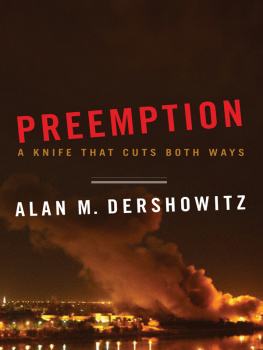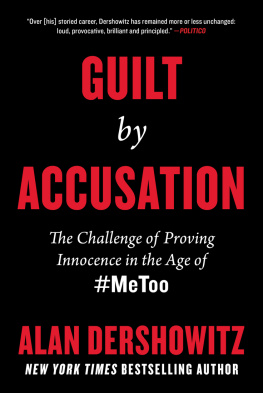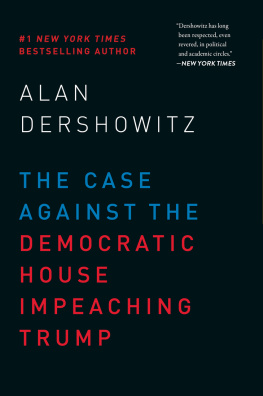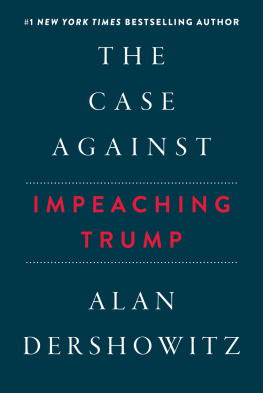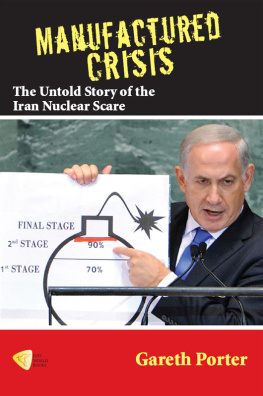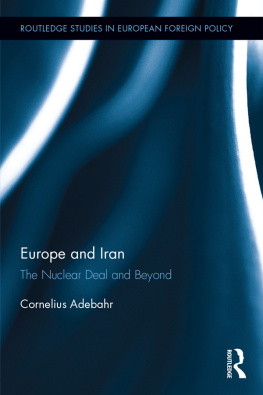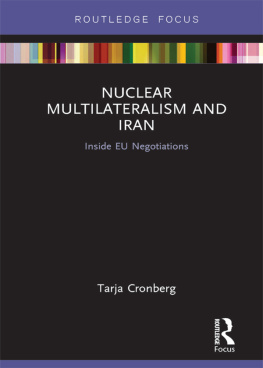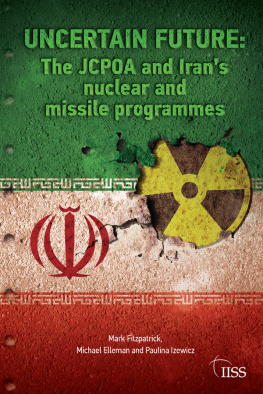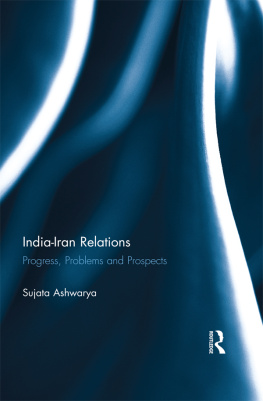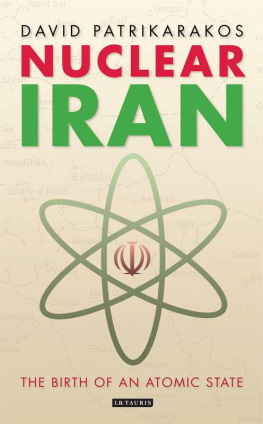ALSO BY ALAN DERSHOWITZ
Abraham: The Worlds First (But Certainly Not Last) Jewish Lawyer
Terror Tunnels: The Case for Israels Just War Against Hamas
Taking the Stand: My Life in the Law
The Trials of Zion
The Case for Moral Clarity: Israel, Hamas and Gaza
The Case Against Israels Enemies: Exposing Jimmy Carter and Others Who Stand in the Way of Peace
Is There a Right to Remain Silent? Coercive Interrogation and the Fifth Amendment after 9/11
Finding Jefferson: A Lost Letter, a Remarkable Discovery, and the First Amendment in an Age of Terrorism
Blasphemy: How the Religious Right Is Hijacking Our Declaration of Independence
Preemption: A Knife That Cuts Both Ways
What Israel Means to Me: By 80 Prominent Writers, Performers, Scholars, Politicians, and Journalists
Rights from Wrongs: A Secular Theory of the Origins of Rights
America on Trial: Inside the Legal Battles That Transformed Our Nation
The Case for Peace: How the Arab-Israeli Conflict Can Be Resolved
The Case for Israel
America Declares Independence
Why Terrorism Works: Understanding the Threat, Responding to the Challenge
Shouting Fire: Civil Liberties in a Turbulent Age
Letters to a Young Lawyer
Supreme Injustice: How the High Court Hijacked Election 2000
Genesis of Justice: Ten Stories of Biblical Injustice That Led to the Ten Commandments and Modern Law
Just Revenge
Sexual McCarthyism: Clinton, Starr, and the Emerging Constitutional Crisis
The Vanishing American Jew: In Search of Jewish Identity for the Next Century
Reasonable Doubts: The Criminal Justice System and the O.J. Simpson Case
The Abuse Excuse: And Other Cop-Outs, Sob Stories, and Evasions of Responsibility
The Advocates Devil
Contrary to Popular Opinion
Chutzpah
Taking Liberties: A Decade of Hard Cases, Bad Laws, and Bum Raps
Reversal of Fortune: Inside the von Blow Case
The Best Defense
Criminal Law: Theory and Process
(with Joseph Goldstein and Richard Schwartz)
Psychoanalysis, Psychiatry and Law
(with Joseph Goldstein and Jay Katz)
The Case Against the Iran Deal: How Can We Now Stop Iran from Getting Nukes?
Copyright 2015 by Alan Dershowitz
Many chapters in this book were originally written and published as op-eds in various publications. Where this is the case, the date of original publication is given as an endnote to the chapter title.
All rights reserved. No part of this book may be used or reproduced in any form or by any electronic or mechanical means, including information storage and retrieval systems, without permission in writing from the publisher, except by a reviewer who may quote brief passages in a review.
First edition published 2015 by RosettaBooks.
Cover design by Jay McNair. Cover photo by Shutterstock / Rob d, edited by Peter Clark.
ISBN (EPUB): 9780795347542
ISBN (Kindle): 9780795347559
www.RosettaBooks.com
This book is lovingly dedicated to my wife, Carolyn Cohen, who helped me in so many ways to write, edit, and produce it.
Contents
Appendix 2:
Joint Comprehensive Plan of Action
Acknowledgments
This book could not have been produced so quickly without the enormous help of Nicholas Maisel, who helped me with the research, my wife, Carolyn Cohen, who provided invaluable assistance in organizing the manuscript, and Maura Kelly, who did most of the typing. My loyal assistant over many years, Sarah Neely, also assisted. My constant acknowledgement to my children for their encouragement and constructive criticism. My appreciation as well to Danny Grossman, who arranged my contacts with Israeli officials, and to Alan Rothfeld for his meticulous input. And finally, to all those who are contributing to the important debate on this critical issue.
The Case Against the Iran Deal
Introduction
The greatest danger the world faces in the twenty-first century is an Iranian nuclear arsenal. Accordingly, the critical question about the agreement recently negotiated with Iran is whether it makes it more likely or less likely that Iran will develop nuclear weapons in the foreseeable future. That is why this nuclear deal may be the most importantand dangerouspolicy decision of the twenty-first century, and why all people who seek peace and security must focus on the agreement and what it portends for the future of the world. That is the subject of this book.
There can be little doubt about the dangers that would be posed by a nuclear armed Iran that already has the capacity to fire missiles into Israel, which it has threatened to annihilate, and into Sunni Arab countries that it seeks to dominate. Its leaders must be taken at their words when they express their hostile aggressiveness and determination to rule a Middle East free of Israel.
In 2004, it was reported that the former president of Iran, Hashemi Rafsanjani, a supposed moderate, had boast[ed] [to an American journalist that] if Iran were to develop nuclear weapons and use them to attack Israel, they would kill as many as five million Jews. He estimated that even if Israel retaliated by dropping its own nuclear bombs, Iran would probably lose only fifteen million people, which he said would be a small sacrifice from among the billion Muslims in the world.
In other words, the not irrational calculation being contemplated by at least some Iranian leaders is that since Israel is a one bomb country, most of whose population (presumably including its 20 percent Arab population) would be killed by one bomb, and since Iran is a far larger country and part of the enormous Muslim world, the trade-off might be worth it, especially to an apocalyptic regime that was prepared to sacrifice hundreds of thousands of its citizensincluding thousands of child soldiersin a futile war with Iraq. Would not such a regime equally be willing to sacrifice millions of its citizens to achieve its major political and religious imperative: namely the annihilation of the nation-state of the Jewish people?
Nor is Israel Irans only potential nuclear target. Several prominent voices within the US and Israeli intelligence communities have warned that Iran is working to develop ICBMs capable of reaching the US. Iran has already tested medium-range ballistic missiles capable of reaching anywhere in the Middle East and much of Europe. If their missiles are nuclearizedas they could be within ten years or soonerthere is no end to the damage Iran can threaten and deliver. That is why the potential of an Iran armed with a nuclear arsenal poses the greatest threat we have confronted in this centurya threat comparable to that posed by a rearmed Germany in the 1930s.
President Obama, himself, seemed to agreebefore his election to a second termthat were Iran ever to develop nuclear weapons, it would be a game changer, and he promised that he would do whatever it takes and everything thats required to eliminate this grave and real security threat not only to the region but to the US.
I have been writing and lecturing about the threat posed by Irans quest for a nuclear arsenal for more than a decade. I have discussed it with President Obama, with his national security staff, with Prime Minister Netanyahu, with high-ranking members of Israels military and intelligence communities, and with leading diplomats, scholars, journalists, and others. I have heard all sides of the issue presented intelligently, passionately, morally, and strategically. Now it is time for me to present the results of this decade-long encounter with the Iranian nuclear weapons program.


